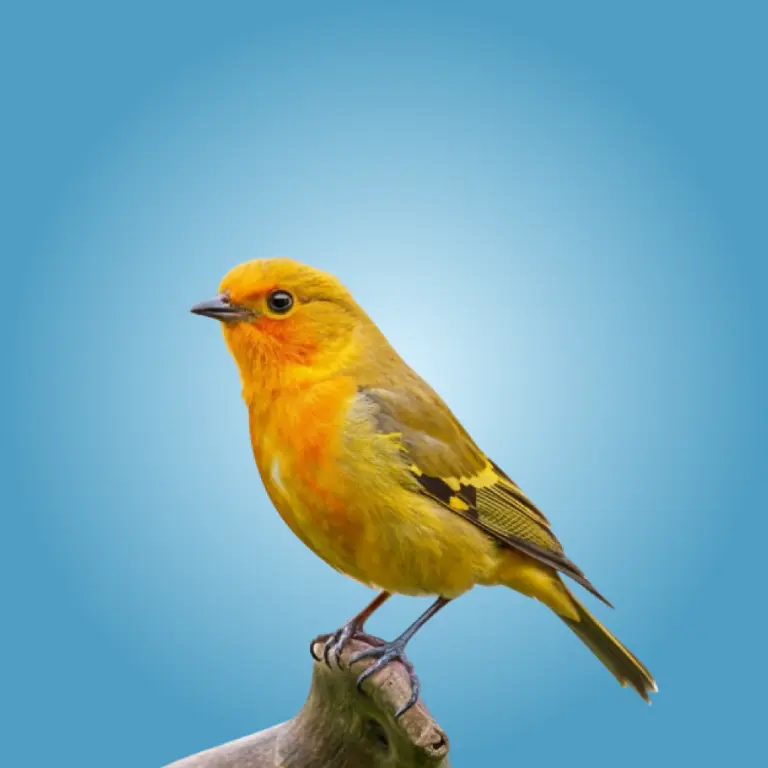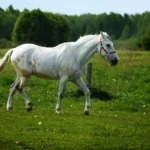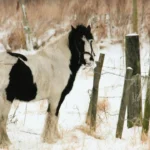If you’re caring for a horse,
types of foods that they can and should eat is essential for their health and happiness.
Horses have specific dietary needs, and providing the right balance of foods helps them stay healthy, energetic, and strong.
While there are many foods horses can eat, it’s important to be selective to avoid health issues.
Let’s look at the best, safest, and most nutritious options for feeding your horse.
Hay: The Foundation of a Horse’s Diet
Hay is the primary food for most horses, especially those that don’t have constant access to pasture. It provides the fiber and nutrients they need for healthy digestion. So we need to learn about types of foods that horses eat.
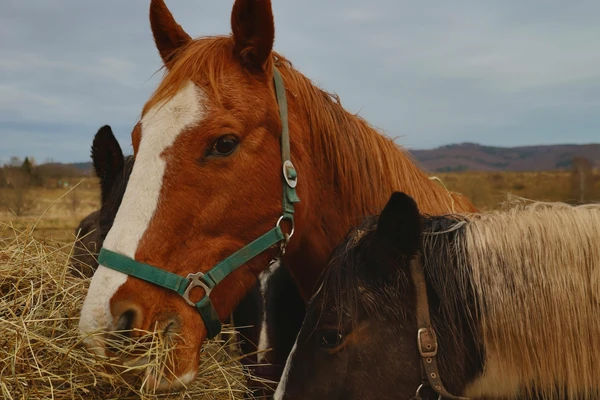
❖ Types: Timothy, alfalfa, and orchard grass are popular types of hay for horses.
❖ Quantity: Most adult horses should eat about 1.5% to 2% of their body weight in hay each day.
❖ Quality: Choose fresh, green hay that’s free of mold and dust. Hay that smells fresh and sweet is best.
Hay helps keep their digestive system functioning properly, so ensuring a consistent supply is crucial.
Fresh Grass: Nature’s Perfect Feed
If you’re lucky enough to have a pasture, allowing your horse to graze is one of the healthiest and most natural ways to feed them. Grass is low in calories, which helps keep weight in check for horses that don’t need many extra calories.
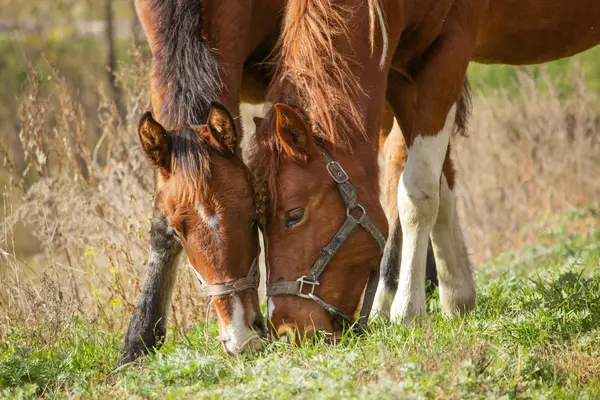
❖ Benefits: Grass provides essential fiber, vitamins, and minerals.
❖ Seasonal Access: Ensure they don’t overgraze, especially in spring when new grass is rich and can cause digestive issues. Too much high-sugar grass can lead to laminitis, a painful hoof condition.
❖ Monitoring: Keep an eye on your horse’s grazing habits, as some horses tend to overeat on fresh pasture.
Grains: Extra Energy for Active Horses
Grains, such as oats, corn, and barley, can be great energy sources for horses with high activity levels or special dietary needs. However, grains aren’t necessary for all horses and should be fed carefully to prevent digestive issues.
❖ When to Use: Grains are often used for working, pregnant, or underweight horses needing extra calories.
❖ Portion Control: Feed grains in moderation. Too much can lead to colic or obesity, so it’s best to consult a vet or equine nutritionist for specific guidelines.
❖ Variety: Oats are popular due to their fiber content, while corn provides higher energy levels.
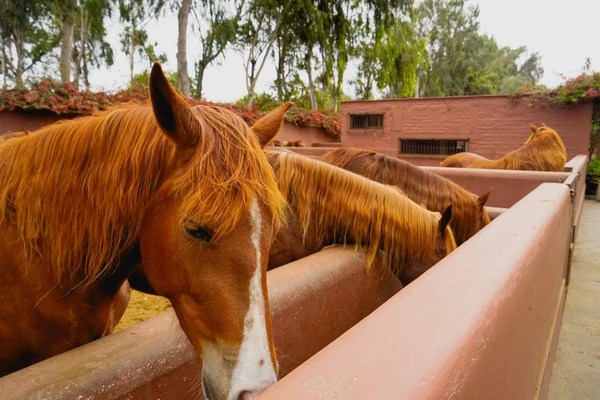
Commercial Horse Feeds: Balanced and Convenient
There are many commercial feeds designed specifically for horses. These feeds are formulated to provide a balanced mix of nutrients, making it easier to meet your horse’s needs without a lot of guesswork.
❖ Types: Feeds come in pelleted, textured, and extruded forms and may target different dietary needs, such as senior feeds, performance feeds, and low-starch formulas.
❖ Advantages: Convenient and balanced, often fortified with vitamins and minerals.
❖ Read Labels: Ensure the feed you choose aligns with your horse’s needs. Avoid those with too much sugar or unnecessary fillers.
Fruits and Vegetables: Tasty Treats
Horses enjoy occasional fruits and vegetables, which can provide essential nutrients and variety. While fruits and veggies should only be given in moderation, they’re a safe and fun way to treat your horse.
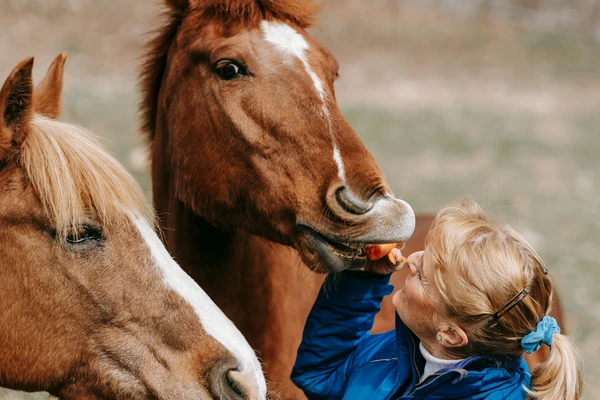
❖ Safe Options: Apples, carrots, bananas, and watermelon are popular choices. Horses also enjoy sweet potatoes and celery.
❖ Portion Control: Give small amounts to avoid upsetting their digestion. For example, one apple or a couple of carrots at a time is plenty.
❖ Avoid: Never feed horses onions, potatoes, or avocados, as these can be toxic.
Supplements: Targeted Nutrition When Needed
Supplements can fill nutritional gaps, especially if your horse has specific health needs or dietary restrictions. Always consult with a veterinarian or equine nutritionist before adding supplements to ensure they’re necessary and beneficial. Learning about types of foods that horses eat is crucial.
❖ Common Supplements: Omega-3 for joint health, biotin for hoof and coat health, and electrolytes for hydration.
❖ Considerations: Only use supplements if your horse needs them—over-supplementing can lead to imbalances.
❖ Vet Approval: Since not all horses need extra nutrients, your vet’s guidance is essential to prevent over-supplementing.
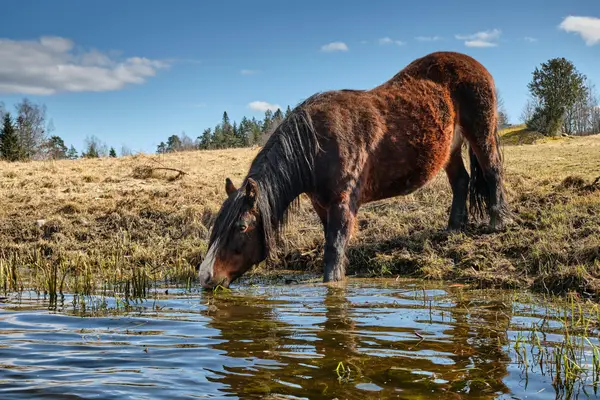
Water: The Most Essential Part of the Diet
Water may not be “food,” but it’s the single most essential part of a horse’s diet. Horses need clean, fresh water daily to stay hydrated and aid digestion. A lack of water can lead to serious health issues, including colic.
❖ Quantity: Most horses drink 5-10 gallons of water a day, more in hot weather or after exercise.
❖ Freshness: Clean water containers regularly to avoid bacteria buildup.
❖ Hydration Tips: During colder months, ensure water isn’t frozen, as horses drink less if it’s too cold.
Final Thoughts
Feeding your horse a safe, nutritious diet is one of the best ways to keep them healthy and happy. Starting with high-quality hay, fresh water, and pasture access forms a solid foundation for any horse. For those with additional needs, grains, commercial feeds, fruits, and supplements offer flexibility to customize their diet.






